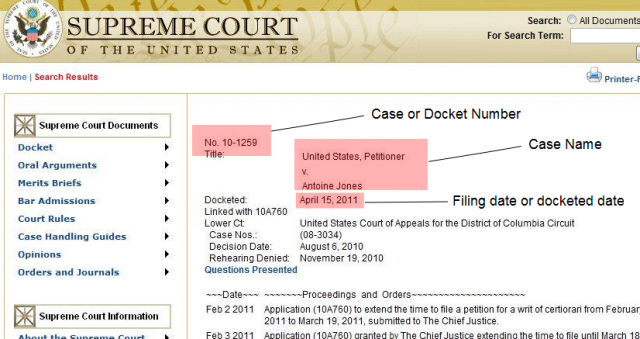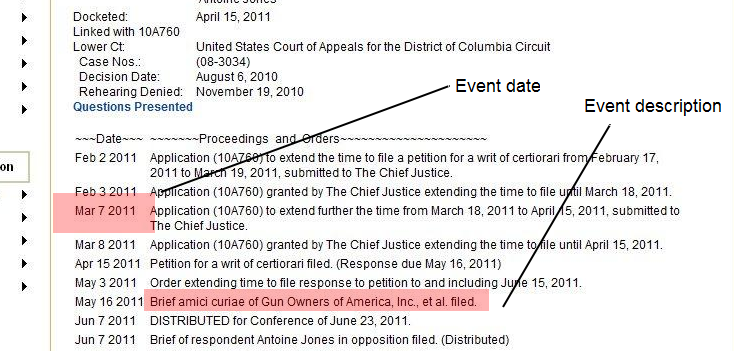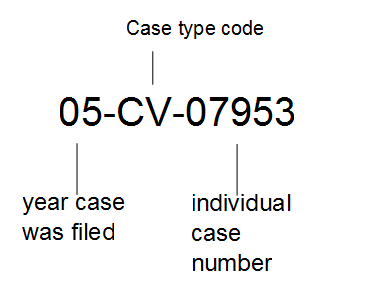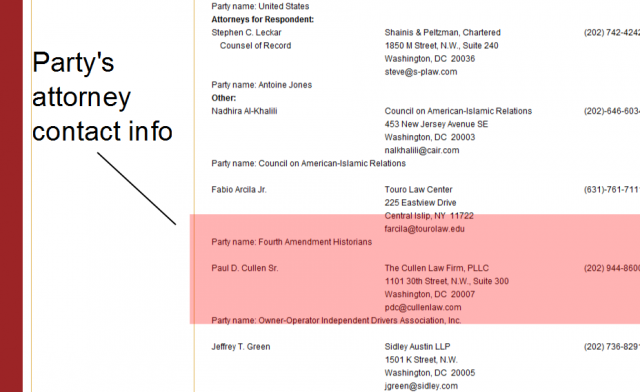Docket Research
What is a docket?
A docket is simply a record of the proceedings of a court case. Dockets vary widely from jurisdiction to jurisdiction in type of information recorded, the detail of the information, and availability to the public. Some jurisdictions have free online docket systems while others require subscription to a database or even visiting the court in-person.
Dockets Generally
Docket research is generally used to find information about a particular case. Dockets contain information about the judge hearing the case, parties involved, attorneys involved, the events of a case, and more.
Dockets are generally more useful for researching trials. Because trials may last many years, and involve many events the dockets are important for locating information about cases.
Examples of documents that can be identified and (sometimes) located by retrieving a trial court docket include: motions, testimony transcripts, jury instructions and worksheets, judge rulings, expert witness names, and more.
Appellate court dockets are usually not highly sought after by researchers. Appellate court opinions make up the body of case law and are readily available in case law databases. Briefs, oral arguments, or other appellate documents are also available in specialized databases. Please see our research guide on locating briefs and oral arguments for more information.
However, appellate court dockets can still be important. Appellate dockets may include important dates, information about briefs filed in a case, case numbers, parties, and attorneys involved.
How do I read a docket?
While docket formats vary, some basic information should be included on all dockets.
Usually a docket will include a case name or party names, and case or docket number. This is illustrated in the image below of a U.S. Supreme Court docket.

Docket details will often list the date of an event, argument, or document submission, as well as some information about the event. This is illustrated in the image below of a U.S. Supreme Court docket.

Finally, dockets often include detailed information about parties and their attorneys. This can be an important tool for finding out which lawyers or law firms are representing clients in cases.
The image below displays a U.S. Supreme Court docket with attorney information.
Federal Appellate Courts
- U.S. Supreme Court dockets since 2000 are available on their website and in Specialized Databases (Westlaw, Lexis CourtLink, Bloomberg Law Dockets, Pacer).
- Federal Courts of Appeals dockets are available in Specialized Databases. Occasionally dockets or individual documents will be posted on the court website, but this is usually only in cases that are important or of special interest.
- Consult Union List of Appellate Court Records and Briefs - Federal and State (2d ed. 2017)
Federal Trial Courts
Federal District courts are the trial courts for the federal government. Published Federal District Court opinions are reported in the Federal Supplement case reporter. Because a trial involves a lot of motion practice (many motions are filed) a judge may issue many rulings. A single trial case may see multiple published opinions. However, the only way to find all the motions, rulings, and more is to view the docket.
How do I find Federal District Court Dockets?
- Individual court websites may post dockets or documents of particular interest to the public. Otherwise dockets and documents must be located in Specialized Databases.
Federal District court cases have a standard numbering scheme which helps somewhat with locating individual cases. The first digits in a case number identify the year the case was filed. This is followed by case-type code. 'CV' identifies a civil case, 'CR' identifies a criminal case, and so forth, this is followed by the case number. An example of this is seen below.

Note: every Federal district court uses this scheme. So while one court will not re-use a case number, one case number may identify multiple cases (each in a different court). Some district courts add judges initials or other identifying information to this standard number.
State Courts
State courts vary widely on trial court access and information. Some states call their trial courts district courts, supreme courts, superior courts, or even have multiple levels of trial courts.
Some states have docket information available for free online. For example, New York State and Washington State have free online databases. Other states have their own proprietary systems and/or require you to locate dockets in Specialized Databases.
How do I find State Court Dockets?
- Check to see if your state has a free online database. Search Google for phrases like '[state name] case search' and so forth.
- Check the Specialized Databases for state court coverage. Just make sure you check that the database includes your state. Some states withhold data from these databases. Some states only have limited coverage with some counties included and others not.
- If you know the specific court in which your case was heard, call the Court Clerk or Records Clerk for that court. If your case appeared in the news see if you can use a news item to narrow down the exact court. Consult Union List of Appellate Court Records and Briefs - Federal and State (2d ed. 2017)
- Contact the state law library. They can often tell you the best way to get state court dockets in their state and may even be able to help locate items for you.
- Contact a reference librarian for help on how to locate state court dockets.
How do I find a document listed on a docket?
Since electronic filing has become the norm in Federal District Courts many documents are available online in PDF format. Of the Specialized Databases (check individual databases listed below for tips on finding documents), PACER has the most reliable access to e-filed documents. Though Westlaw, Lexis, and Bloomberg have some access to the electronic documents. They have also made good use of their manually collected documents and started making these collections available.
State courts are more difficult to locate. Sometimes your best option is to contact a court directly with the case number and information from the document. You can also contact a librarian for help getting a document.
Specialized Databases
PACER -stands for Public Access to Court Electronic Records. This is the official case location system for the federal government. Most of the material that is available on PACER is available in the docket databases on Bloomberg Law and Westlaw. PACER has a few more of the underlying documents and is the only source for certain types of cases, Bloomberg Law and Westlaw have all of the docket information available in PACER (except for a few classes of cases) and most of the underlying documents. In addition, Bloomberg Law includes access to many state dockets and some UK dockets.
Bloomberg Law and Westlaw should be your first docket research stop.
The law library does NOT reimburse for PACER, which charges $.10 per page VIEWED. If you need to research court records and suspect that you might need access to PACER, please schedule a meeting with a reference librarian. We can discuss alternative sources for court records as well as sources for funding in the event that you need to use PACER.
PACER requires you register for an individual login.
- The case locator allows you to search multiple courts at the same time.
- If you have a specific court you'd like to search you can log into the individual court PACER site.
- If a document number is hyperlinked you can download that document for a charge of $.10 per page.
- Note: every Federal Court maintains their own PACER site which is why you have to search them individually. But your password will work across all sites.
Westlaw - This includes full coverage of Federal Court dockets (same data from PACER) and state court coverage. State coverage varies in both states and counties covered, and which case types are included (civil & criminal).
- You can check Westlaw Dockets coverage using this coverage map.
- Some documents are available, some will tell you that Access is Denied. You can also check the "Filings" tab when you find a docket to see if any of the case documents are available.
- Simply select "Dockets" from the top menu when log in to search their dockets.
- Links that are blue indicate a document is available to download. Green links mean a document is not available.
Lexis - Lexis dockets come from a separate product called CourtLink. But Lexis has been integrating dockets into their regular products. This includes full coverage of Federal Court dockets (same data from PACER) and state court coverage. State coverage varies in both states and counties covered, and which case types are included (civil & criminal).
- Lexis Advance includes dockets searching. Select "Dockets" from the "All Content Types" menu on the home screen.
- Note: Some docket information in Lexis Advance appears to be incomplete.
How to search PACER
PACER is the official case location system for the federal government, but searches are somewhat limited (not full text). This tutorial will show you how to find the records of a particular court, including how to find cases by name, date, and docket number. Included is a demo of the PACER case locator, which allows you to search multiple courts at the same time, and a demonstration of how to retrieve statistical reports on the activities of a particular court.
- Most of the material that is available on PACER is available in the docket databases on Bloomberg Law and Westlaw. Those databases should be your first docket research stop.
- PACER charges $0.10 per page VIEWED.
- You must register for your own PACER account here.
PACER user documentation and tutorials from the Administrative Office of the U.S. Courts
Find user documentation, learning aids, and how to videos on finding federal court records online using PACER.
